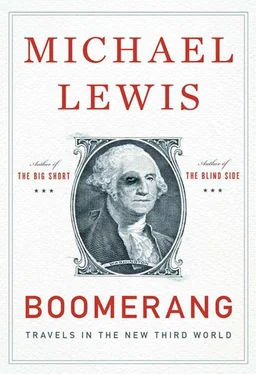On he went, describing a system that was, in its way, a thing of beauty. It mimicked the tax-collecting systems of an advanced economy—and employed a huge number of tax collectors—while it was in fact rigged to enable an entire society to cheat on their taxes. As he rose to leave, he pointed out that the waitress at the swanky tourist hotel failed to provide us with a receipt for our coffees. “There’s a reason for that,” he said. “Even this hotel doesn’t pay the sales tax it owes.”
I walked down the street and found waiting for me, in the bar of another swanky tourist hotel, the second tax collector. Tax Collector No. 2—casual in manner and dress, beer-drinking, but terrified that others might discover he had spoken to me—also arrived with a binder full of papers, only his was stuffed with real-world examples not of Greek people but Greek companies that had cheated on their taxes. He then started to rattle off examples (“only the ones I personally witnessed”). The first was an Athenian construction company that had built seven giant apartment buildings and sold off nearly a thousand condominiums in the heart of the city. Its corporate tax bill honestly computed came to 15 million euros, but the company had paid nothing at all. Zero. To evade taxes it had done several things. First, it never declared itself a corporation; second, it employed one of the dozens of companies that do nothing but create fraudulent receipts for expenses never incurred and then, when the tax collector stumbled upon the situation, offered him a bribe. The tax collector blew the whistle and referred the case to his bosses—whereupon he found himself being tailed by a private investigator, and his phones tapped. In the end the case was resolved, with the construction company paying 2,000 euros. “After that I was taken off all tax investigations,” said the tax collector, “because I was good at it.”
He returned to his thick binder full of cases. He turned the page. Every page in his binder held a story similar to the one he had just told me, and he intended to tell me all of them. That’s when I stopped him. I realized that if I let him go on we’d be there all night. The extent of the cheating—the amount of energy that went into it—was breathtaking. In Athens, I several times had a feeling new to me as a journalist: a complete lack of interest in what was obviously shocking material. I’d sit down with someone who knew the inner workings of the Greek government: a big-time banker, a tax collector, a deputy finance minister, a former MP. I’d take out my notepad and start writing down the stories that spilled out of them. Scandal after scandal poured forth. Twenty minutes into it I’d lose interest. There were simply too many: they could fill libraries, never mind a book.
The Greek state was not just corrupt but also corrupting. Once you saw how it worked you could understand a phenomenon that otherwise made no sense at all: the difficulty Greek people have saying a kind word about one another. Individual Greeks are delightful: funny, warm, smart, and good company. I left two dozen interviews saying to myself, “What great people!” They do not share the sentiment about one another: the hardest thing to do in Greece is to get one Greek to compliment another behind his back. No success of any kind is regarded without suspicion. Everyone is pretty sure everyone is cheating on his taxes, or bribing politicians, or taking bribes, or lying about the value of his real estate. And this total absence of faith in one another is self-reinforcing. The epidemic of lying and cheating and stealing makes any sort of civic life impossible; the collapse of civic life only encourages more lying, cheating, and stealing. Lacking faith in one another, they fall back on themselves and their families.
The structure of the Greek economy is collectivist, but the country, in spirit, is the opposite of a collective. Its real structure is every man for himself. Into this system investors had poured hundreds of billions of dollars. And the credit boom had pushed the country over the edge, into total moral collapse.
KNOWING NOTHING ELSE about the Vatopaidi monastery except that, in a perfectly corrupt society, it had somehow been identified as the soul of corruption, I made my way up to the north of Greece, in search of a bunch of monks who had found new, improved ways to work the Greek economy. The first stage was fairly easy: the plane to Greece’s second city of Thessaloníki, the car being driven along narrow roads at nerve-racking speeds, and a night with a lot of Bulgarian tourists at a surprisingly delightful hotel in the middle of nowhere called the Eagles Palace. There the single most helpful hotel employee I have ever met (ask for Olga) handed me a stack of books and said wistfully how lucky I was to be able to visit the place. The Vatopaidi monastery, along with nineteen others, was built in the tenth century on a thirty-seven-mile-long-by-six-mile-wide peninsula in northeast Greece called Mount Athos. Mount Athos now is severed from the mainland by a long fence, and so the only way onto it is by boat, which gives the peninsula the flavor of an island. Onto this island no women are allowed—no female animals of any kind, in fact, except for cats. The official history ascribes the ban to the desire of the church to honor the Virgin; the unofficial one to the problem of monks hitting on female visitors. The ban has stood for one thousand years.
This explains the high-pitched shrieks the next morning, as the ancient ferry packed with monks and pilgrims pulls away from the docks. Dozens of women gather there to holler at the top of their lungs, but with such good cheer that it is unclear whether they are lamenting or celebrating the fact that they cannot accompany their men. Olga has told me that she was pretty sure I was going to need to hike some part of the way to Vatopaidi, and that the people she has seen off to the holy mountain don’t usually carry with them anything so redolent of the modern material world as a wheelie bag. As a result, all I have is an Eagles Palace plastic laundry bag with spare underwear, a toothbrush, and a bottle of Ambien.
The ferry chugs for three hours along a rocky, wooded, but otherwise barren coastline, stopping along the way to drop monks and pilgrims and guest workers at other monasteries. The sight of the first one just takes my breath away. It’s not a building but a spectacle: it’s as if someone had taken Assisi or Todi or one of the other old central Italian hill towns and plopped it down on the beach, in the middle of nowhere. Unless you know what to expect on Mount Athos—it has been regarded by the Eastern Orthodox Church for more than a millennium as the holiest place on earth, and it enjoyed for much of that time a symbiotic relationship with Byzantine emperors—these places come as a shock. There’s nothing modest about them; they are grand and complicated and ornate and obviously in some sort of competition with one another. In the old days, pirates routinely plundered them, and you can see why: it would be almost shameful not to, for a pirate.
There are many places in the world where you can get away with not speaking Greek. Athens is one of them; the Mount Athos ferryboat is not. I am saved by an English-speaking young man who, to my untrained eye, looks like any other monk: long dark robes, long dark shaggy beard, fog of unfriendliness which, once penetrated, evaporates. He spots me using a map with thumbnail sketches of the monasteries and trying to determine where the hell I am meant to get off the boat: he introduces himself. His name is Cesar; he’s Romanian, the son of a counterespionage secret policeman in the nightmarish regime of Nicolae Ceaus¸escu. Somehow he has retained his sense of humor, which counts as some kind of miracle. He explains that if I knew anything about anything I would know that he was no monk, merely another Romanian priest on holiday. He’s traveled from Bucharest, with two enormous trunks on wheelies, to spend his summer vacation in one of the monasteries. Three months living on bread and water with no women in sight is his idea of a vacation. The world outside Mount Athos he finds somehow lacking.
Читать дальше












